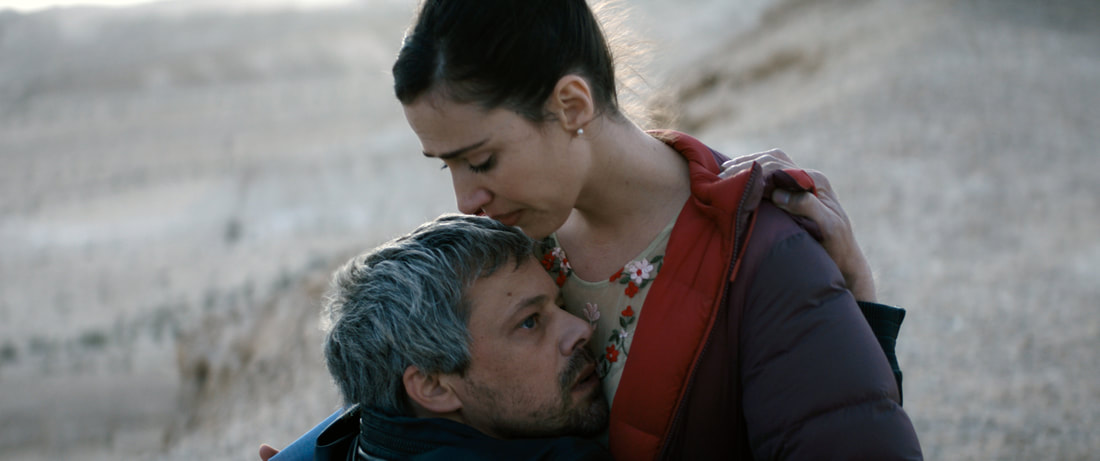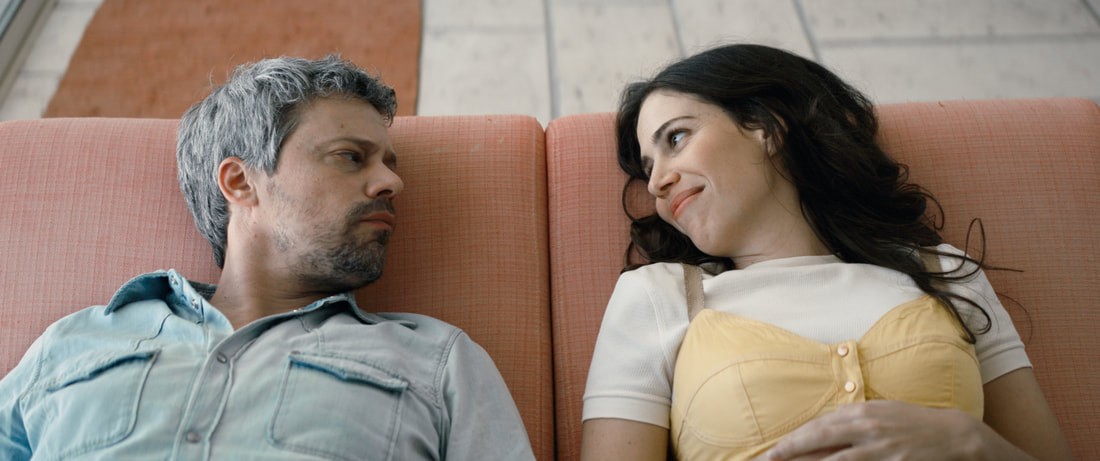|
Interview by Sean Boelman
Nadav Lapid’s films play an interesting balancing act: impassioned yet not excessively overt, artistic but not inaccessible, and political while still being thoroughly empathetic. He truly is one of the best, most personal filmmakers working today, and his latest film, Ahed’s Knee, is one of his angriest and most intimate yet. We at disappointment media had the opportunity to talk with Lapid about his film and style. Check out the interview below!
On Ahed's Knee
disappointment media: What stood out to you about Ahed Tamini’s story as the perfect bookends for this story?
Nadav Lapid: I thought that you see so many movies about poets and you never hear their poems and painters and you never see their paintings and I thought it an interesting way, you know, to get to know the essence of this guy, the film director, by casting scene for project, a film that probably will never be shot. There's something in the Ahed Tamini case you know, that is really kind of the meeting point between something that, on one hand is extremely concrete and political and relevant and something that comes from the here and now, and on the other hand, you know, there's something about Ahed Tamini that I told myself that if she would have lived in the I don't know, in the 15th century, it would have become like, I think, extremely desirable topic for painters like Leonardo da Vinci, and Raphael and whoever, because because there was something so iconic about it, something majestic about it. If you freeze this video, seeing her facing the armed soldier, you dive in a second into the world of myths and legends and something that goes beyond a village in the West Bank and Israeli occupation. It's kind of a meeting point between liberty of speech, the Government of Israel, you know. And then the movie ends with the Earth seen from the sky, something that looks at the history of mankind, at human fate, human destiny, the state of the human. Something that is all the time in the extreme close up and extreme long shot. disappointment: So obviously, the film says a lot about censorship. Why are you especially interested in the topic of censorship in Israel? Lapid: First of all, I don't know if I'm especially passionate about the topic of censorship. I'm sure that I'm especially passionate, or that I'm eager to dig inside this material that I identify as the Israeli collective soul or as the DNA of this society. And all sorts of angles, you know, and censorship is one of them. I think that in my previous movies, there was all the time this verbal obsession, the place of words, and in a way, this desire to say things as they are, to name things by their true names. And this belief that by naming something, you can redeem it, or you can save it, or you can redeem yourself, or you can change the course of things, etc. And I think that there's something in this act of censorship, I mean, especially the way that it's in the movie. I mean, actually, they tell him, "You can use only the words that we give you. The words that you want to use, you can't use them. You can use only the words that you don't want to use. And of these words, you can say whatever you want, but we are going to give you the bank of words." And in a way, his project is trying to crush it, to reject it exactly by using his words and by using all the words. His obsession for details, for saying everything, I think it's really based on this anti-censorship thing, on saying everything excessively, or this feeling that only saying everything can tell the thing as it is. disappointment: I thought that it was really interesting in the film that neither of the main characters was really a hero, and neither was really a villain. It's kind of a lot more complex than that. Can you kind of speak to that? Lapid: Yeah, I think first of all, that in a way, sick societies give you only bad choices. I mean, it's a little bit like in this fable that he's telling about the military service, the torture victim, and the one who observed from a distance. In a way one can't tell if he was this one, this one because one can guess that, at the end, we are all composed of all these aspects. So, in a limited similar way in the movie, you know, you have only bad choices. You can make the noble choice, to be the one who resists, the one who fights, the one who rejects, the one who is opposed. But then, you know, you think about it humanly, you do it for one year, two years, 10 years, 20 years, your entire life, just at the moment, of course, you start to reject everything. I mean fighting all your life against monsters then turns in your head, everyone to a monster and then yourself, you become a monster. You have the feeling that everyone is an enemy, that everyone is hostile, and you lose very quickly the basic human empathy towards the other, the basic human connection. So being for too long right, feeling that all the others are wrong, can easily turn you into a terrible person. And it makes you exhausted and it makes you impatient and aggressive. And at the end, in a way, you're sick, or you get exactly the same diseases that you're trying to heal. So this is one choice and the other choice is to be positive, you know, to believe that you can change things, to believe in the people, to be enthusiastic, to believe that you can work inside the system, to be vividly devoted, like this girl, you know, full with energy, devoted so much to her vision of spreading art. The only thing that she has to sign is the small agreement with the devil. She can do whatever she wants, she just has to make people sign these forms. And she just should turn her eyes when she's doing something that deep inside she knows is wrong. So that's why in a way you can be the human kind and nice collaborator or the arrogant and aggressive and hostile resistant. Both in a way, are bad choices. On Making Films in Today's Climate
disappointment: So you mentioned part of the film is about spreading art to and culture to remote areas that otherwise wouldn't get to see this type of challenging art. How do you think that people can help bring this type of challenging art to those people who wouldn't be exposed to it?
Lapid: My movies, I don't know if they are complicated, but I always want to believe that they are not snobbish. I mean, they are not snobbish because I think that, you know, snobbish filmmakers, they put intention in leaving all sorts of barriers, in order that only a very narrow club could get in. A little bit like a fancy party in Cannes, you know. I truly believe that my movies are aimed at each and every human being, because they talk in a way about each and every human being and about things that are inside all of us. Of course, I use formal tools and strategies that maybe are not very recurrent in most movies. But you know, I mean, sometimes you feel that today, the worst thing they can say about your movie is that it's extremely original. But I would say I don't understand filmmakers who don't like adventures, who don't like cinematic adventures, And even more, I can't understand filmmakers who invest time and energy in developing the script and working with the actors, but don't look for their own form. The special form of their movie. For me, it's as if you write the most intimate and personal love letter or suicide letter, and you find the form on Google. So I tend to believe that these singular formalistic elements of my movies, turn them at the end more communicative because I think they turn them less objective, less cold, and more true and personal. But of course, you know that in a universe, where people are inundated by a kind of formatted art, every difference is a barrier, is an obstacle. And talking now a little bit about the sociology of art, I think there is this middle class that once felt obliged to know the key authors and the key pieces of art in a lot of domains, but let's say in cinema, whether they like them more or like them less but but it was a part of, of almost of being a member in a certain circle of society. Today, a lot of this middle class became totally indifferent to cinema, especially to everything that is in any way demanding. I don't know, maybe they like restaurants. But it's not like you know, I have magical solutions. I mean, Godard once called himself a successful director of unsuccessful movies. The only thing I can do is to try to keep on talking in the most honest way I know about existence and to hope that there will be as many people as possible, that it will really count that what I do is really count for them. I also think that we tend to count numbers, numbers of spectators, numbers of tickets. Okay, which is a certain criteria, but people ignore parallel criteria, which is to which extent people were shaken at what they saw, which was important. If 1000 people fill the theater to watch your movie, and 100 hated it, but 900 out of them thought the movie was really nice and will totally forget it when they get to the parking lot. So according to certain criterias it's great, because you filled the theater, but what exactly does it mean? I do feel that, you know, beyond numbers, there is our group of people that this cinema talks to in a very intimate way. disappointment: So, the politics in your films are definitely very nuanced. I mean, you have this complex relationship with Israel in your films where it is critical of them, but it's also a love letter to Israel in some ways. How do you think this has evolved through your filmography? Lapid: I think it became more and more frontal and naked, in a way. I mean, they don't have the desire or the energy to faint. And to use all sorts of formulas, and something very raw, very frontal, and very direct. They need less and less detours. I have less and less patience for this round, elaborated script that will give you the excuse to get to a certain point and I'm more and more fascinated by the cinematic gestures that contain the truth inside it. And this is also on the political aspect. Afterwards of course, in a way more frontal, more brutal, more direct, strangely enough it becomes complex because it also exposes its opposite. I mean, you know, when you shout and curse with so much enthusiasm, of course, you also reveal a huge intimacy.
Ahed’s Knee is now playing in theaters.
0 Comments
Leave a Reply. |
Archives
March 2024
Authors
All
|
|
|
disappointment media
Dedicated to unique and diverse perspectives on cinema! |


